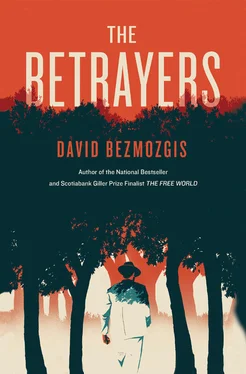Liberated from past constraints, free to indulge themselves as they wished — as they had declared they would if only given the chance — neither of them could quell the feelings of restlessness and anxiety. Kotler had been on the run for nearly two days. He’d packed his little suitcase and slipped out of his house before dawn on Friday, hiding out first in his office and later in Leora’s apartment. And for much of the day now he and Leora had been traveling, beginning with the surreptitious early-morning flight from Tel Aviv to Kiev, another from Kiev to Simferopol, the bus from there to Yalta, and then the imbroglio with the hotel. All this time they’d barely had a chance to catch their breath and apprise themselves of what was happening in the world. In Kiev, during their layover, they had briefly been able to access the Internet, but it had still been too soon for there to have been any reaction or commentary. Leora had also phoned her father and had the pained, unpleasant conversation. Kotler stood beside her, close enough to overhear part of what her father said and to feel the blot of disapproval. She was her parents’ only child, very much her father’s daughter, and had lived her life to merit his good opinion. A decade younger than Kotler, Leora’s parents had also been Zionists and refuseniks. When their application to emigrate was denied, they’d been trapped in Russia for the final eight years of Soviet rule, though, unlike Kotler, they had been spared the adventure of the Gulag. Yitzhak and Adina Rosenberg — good, intellectual, fair-minded people. Kotler came to know them in Israel at the periodic gatherings of former refuseniks. It was at one of these gatherings that Yitzhak introduced Kotler to his young daughter, a top student at Hebrew University with an interest in politics. When Kotler later hired Leora for his staff, her parents were exceedingly grateful. That was four years ago. Each of those years, they sent a fruit basket to Kotler’s house for Rosh Hashanah. Rosh Hashanah was again approaching, but Kotler supposed there would be no fruit basket this year.
To get to the heart of Yalta, he and Leora didn’t bother to ask Svetlana for directions but left through the back door, scattering fowl. Kotler led them toward the coast. He flattered himself by thinking that he was navigating from childhood memory, that his sense of the place inhered in him from all those years ago. Closer to the truth was that the town was not very large and sloped downward toward the sea. A few stops on a minibus soon returned them to the tourist center, depositing them near Lenin Square, where, framed heroically by the Crimean Mountains, the bronze Bolshevik still stood on his pedestal looking intently out to sea — and peripherally at a McDonald’s. In time, Kotler thought, the good citizens of Yalta might resolve, if not to add a pile of bones at his feet, then at least to replace him.
Without too much trouble, Kotler and Leora located an Internet café, dark as a grotto and occupied mostly by teenage boys wearing headphones and hollering to one another as they shot at Chechens or the Taliban on their computer screens. Kotler had once caught Benzion playing a similar game. A sensitive, studious boy, he was then a student at the yeshiva. Seeing his father’s reaction, he’d said shamefacedly, The guys were playing it. Now, stationed near Hebron, he was no longer playing.
They found two available terminals next to each other at the back of the café and began with the Israeli press. It didn’t take them long to find what they were looking for. The lead stories in both Haaretz and the Jerusalem Post featured the same photograph of the two of them in the Tel Aviv airport. The photograph captured them as they presented their documents at the ticket counter. It had been taken from a distance, furtively, by another traveler, Kotler presumed, as the professionals never suffered from such scruples. Still, there could be no mistaking their identities, particularly his — though he supposed Leora had now attained a level of notoriety to match his own. Haaretz also provided a companion photo of his wife shopping for Shabbat at a market near their Jerusalem home. In the photo, Miriam looked every bit the aggrieved, steadfast spouse, the victim of her husband’s treachery. For the article, she said only that she refused to discuss “a private family matter.” Kotler could imagine the scene at the market, the pestering, beseeching journalists. But with Miriam they stood no chance. At this thought Kotler permitted himself a fond smile. Miriam was a rock. In her time she had undergone a harsh apprenticeship and was as canny about the press as any image consultant. The reporters could flatter themselves that they had caught her in an unguarded moment, but Kotler would have been surprised — and, frankly, disappointed — if Miriam hadn’t orchestrated the whole thing, down to the potato in her hand when they took her picture.
In both newspapers, “the scandale Kotler” shared the front page with news of the Knesset’s vote in favor of the withdrawal from the settlement bloc. It had gone as predicted, with the prime minister’s coalition eking out a narrow majority. Kotler, not wanting to be on record as merely abstaining, had cast his vote the previous day, shortly before his ignominious escape. The Haaretz article listed his name among the notable opponents, prominent among the defectors from the prime minister’s cabinet. Then there were the obligatory quotes from the various factions. The same choir singing the same song. The prime minister cited defensible borders and the welfare of the Israeli state. The chief of staff spoke of the army’s inviolable discipline. The Left rejoiced. The Right seethed. The Americans applauded. The settlers pledged bloody insurrection. And the Palestinians complained.
The din would continue until the operation was executed. What happened then, nobody knew. Nothing good, was Kotler’s opinion. The only question was just how bad.
He felt Leora’s hand on his arm. On her computer screen was displayed a column from an Israeli Russian newspaper. There again was the same grainy photograph from the airport.
— At least here someone bothered to add one plus one, Leora said.
That someone was Chava Margolis, his old friend turned foe, once the mother superior of the Moscow Zionists, the strict, ascetic Krupskaya of their movement. As one of the witnesses against him in his Jerusalem trial, she had later wished to undo him, but here she was saying what any reasonable person should have said: That it was cynical and vindictive of the prime minister to destroy a man’s family simply because that man wouldn’t bend to his political will. That such an act tarnished the prime minister far more than it did Kotler, particularly as, in the end, it achieved no political goal. And that even people like herself, who had long since grown disenchanted with Kotler, should, instead of gloating over his humiliation, take a moment to reflect upon the reptilian soul of the man who was leading their country. She then added, as professional journalistic practice demanded, that her accusations against the prime minister were speculative, given that no evidence had yet been found to connect him to the incriminating photographs that had been leaked, anonymously, to the press. But she felt that only a child of extraordinary naïveté would believe that the prime minister wasn’t involved. And she hadn’t met any such children in the entire state of Israel.
Kotler knew that no evidence would ever be found. The prime minister was many things, but he was no amateur. Kotler doubted the press would ever even trace the man who had contacted him. Kotler had known more than his share of security agents and spies, and, as in any walk of life, there were the addle and the adept. But the man he had met, who had introduced himself as Amnon, was a seasoned operator.
Читать дальше












